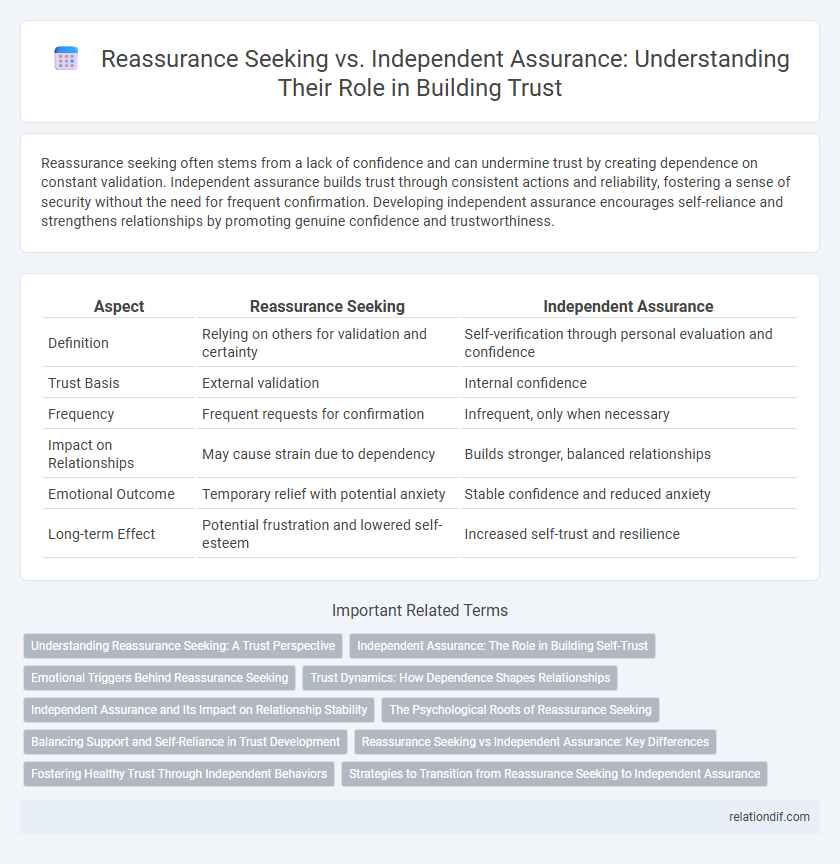Reassurance seeking often stems from a lack of confidence and can undermine trust by creating dependence on constant validation. Independent assurance builds trust through consistent actions and reliability, fostering a sense of security without the need for frequent confirmation. Developing independent assurance encourages self-reliance and strengthens relationships by promoting genuine confidence and trustworthiness.
Table of Comparison
| Aspect | Reassurance Seeking | Independent Assurance |
|---|---|---|
| Definition | Relying on others for validation and certainty | Self-verification through personal evaluation and confidence |
| Trust Basis | External validation | Internal confidence |
| Frequency | Frequent requests for confirmation | Infrequent, only when necessary |
| Impact on Relationships | May cause strain due to dependency | Builds stronger, balanced relationships |
| Emotional Outcome | Temporary relief with potential anxiety | Stable confidence and reduced anxiety |
| Long-term Effect | Potential frustration and lowered self-esteem | Increased self-trust and resilience |
Understanding Reassurance Seeking: A Trust Perspective
Reassurance seeking involves actively searching for validation and support from others to alleviate doubts and fears, often reflecting underlying insecurities in trust relationships. Independent assurance, by contrast, relies on personal confidence and internal validation without constant external confirmation, fostering a more resilient and autonomous trust dynamic. Understanding reassurance seeking from a trust perspective highlights the importance of balancing external support with internal trust-building to promote healthier interpersonal connections.
Independent Assurance: The Role in Building Self-Trust
Independent assurance plays a crucial role in building self-trust by fostering confidence through personal validation rather than relying on external approval. It encourages individuals to evaluate their own decisions and actions objectively, strengthening internal trust mechanisms. Cultivating independent assurance leads to greater emotional resilience and promotes autonomy in managing uncertainty and challenges.
Emotional Triggers Behind Reassurance Seeking
Reassurance seeking often stems from emotional triggers such as anxiety, fear of rejection, and low self-esteem, which drive individuals to repeatedly seek validation to alleviate their insecurities. This behavior contrasts with independent assurance, where confidence and self-trust reduce the reliance on external confirmation, fostering emotional stability and resilience. Understanding these emotional triggers is essential for developing healthier trust dynamics and promoting personal emotional growth.
Trust Dynamics: How Dependence Shapes Relationships
Reassurance seeking often signals underlying insecurity, prompting repeated validation that can strain trust dynamics and create dependency in relationships. Independent assurance, grounded in consistent actions and reliability, fosters stable trust by reducing the need for constant external confirmation. Dependence on reassurance may hinder emotional autonomy, while cultivating independent assurance promotes resilience and healthy interdependence.
Independent Assurance and Its Impact on Relationship Stability
Independent assurance fosters trust by encouraging self-validation and reducing reliance on constant reassurance from others. This approach enhances relationship stability by promoting confidence and emotional resilience within individuals. Research shows that partners who practice independent assurance experience fewer conflicts and greater long-term satisfaction.
The Psychological Roots of Reassurance Seeking
Reassurance seeking often stems from underlying anxiety and low self-esteem, where individuals rely on external validation to feel secure. This behavior is rooted in attachment theory, with insecure attachment styles prompting frequent requests for confirmation to alleviate internal doubts. Understanding these psychological foundations highlights the contrast to independent assurance, which relies on self-confidence and internalized trust rather than external feedback.
Balancing Support and Self-Reliance in Trust Development
Reassurance seeking involves regularly seeking external confirmation to alleviate doubts, which can strengthen trust but may also lead to dependency. Independent assurance relies on self-confidence and internal validation, fostering resilience and more stable trust foundations. Balancing these approaches encourages supportive relationships while promoting personal autonomy, critical for sustainable trust development.
Reassurance Seeking vs Independent Assurance: Key Differences
Reassurance seeking involves repeatedly asking for confirmation from others to alleviate doubt or anxiety, often leading to dependency and decreased self-confidence. Independent assurance is based on self-validation, relying on personal judgment and internal trust without external validation. Key differences lie in the source of confidence and the potential impact on emotional resilience, where reassurance seeking may undermine autonomy while independent assurance fosters self-reliance.
Fostering Healthy Trust Through Independent Behaviors
Fostering healthy trust relies on cultivating independent assurance rather than reassurance seeking, which often leads to dependency and insecurity. Independent assurance encourages self-confidence and resilience by relying on personal judgment and consistent experience rather than external validation. Building trust through autonomous behaviors strengthens relationships and promotes emotional stability in both personal and professional environments.
Strategies to Transition from Reassurance Seeking to Independent Assurance
Transitioning from reassurance seeking to independent assurance involves cultivating self-confidence through consistent self-reflection and setting achievable personal goals. Applying mindfulness techniques and cognitive behavioral strategies helps reduce dependency on external validation while reinforcing internal trust mechanisms. Developing critical thinking skills and embracing uncertainty enables individuals to build resilience and maintain trust without relying excessively on others.
Reassurance Seeking vs Independent Assurance Infographic

 relationdif.com
relationdif.com